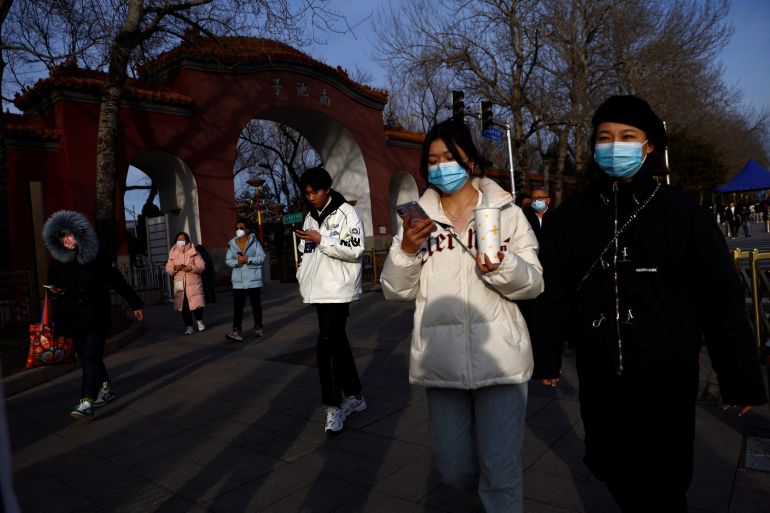Did a report really say masks don’t help prevent the spread of COVID?
A report from early 2023, which some claim questions the efficacy of masks, has resurfaced amid a rise in new coronavirus variants.

The recent discovery of new coronavirus strains has triggered fears of a new wave of restrictions, more than three years since the COVID-19 pandemic forced lockdowns and stringent restrictions.
It has also reignited a discussion over the efficacy of face masks in preventing transmission – an increasingly divisive topic that has often veered out of the control of experts and into the realm of politically charged online debates.
Keep reading
list of 3 itemsSouth Africa ‘held to ransom’ by big pharma, overcharged for COVID vaccines
WHO sees ‘concerning’ COVID trends before winter as hospitalisations rise
A study published by the Cochrane Library earlier this year, which appeared to raise questions about the efficacy of masks, has also been thrown into the limelight.
Here is all you need to know about the report, and what the experts say about wearing masks in 2023:
What does the Cochrane report say?
Cochrane is a non-for-profit international network, which includes researchers, health professionals, patients and carers from all over the world.
The report, published in January 2023, included trials which compared medical/surgical masks versus no masks in the prevention of the spread of viral respiratory illness.
The results from those trials indicated that “wearing masks in the community probably makes little or no difference to the outcome of influenza‐like illness”.
However, the report’s conclusion urged caution and said there was “a high risk of bias in the trials, variation in outcome measurement, and relatively low adherence with the interventions during the studies hampers drawing firm conclusions”.
Did the report really say masks do not slow the spread of COVID-19?
This is disputed. Cochrane officially says the report was inconclusive and one of the report’s co-authors says there is no evidence masks work.
Karla Soares-Weiser, editor-in-chief of the Cochrane Library, responded to reports saying that “masks don’t work” as an “inaccurate and misleading interpretation”.
“It would be accurate to say that the review examined whether interventions to promote mask-wearing help to slow the spread of respiratory viruses, and that the results were inconclusive,” she said.
In March, Tom Jefferson, a British epidemiologist who was the lead author of the report, told a journalist that “there is just no evidence that they [masks] make any difference”.
What do the experts say about the report?
Many scientists and public health professionals have since warned against drawing conclusions from the report, highlighting several crucial flaws in the systematic review.
Dr Anthony Fauci, the former director of the National Institute of Allergy and Infectious Diseases, recently pushed back against the report in an interview.
“When you’re talking about the effect on the epidemic or the pandemic as a whole, the data are less strong, but when you talk about an individual basis of someone protecting themselves or protecting themselves from spreading it to others, there’s no doubt that there are many studies that show that there is an advantage” to wearing masks, he said.
Dr Lucky Tran, a scientist at Columbia University, wrote in an opinion piece entitled “Don’t believe those who claim science proves masks don’t work” where he claimed the “analysis [by Jefferson and his team] is flawed because it compares apples to oranges”.
A New York Times opinion piece – “Here’s Why the Science Is Clear That Masks Work” – quoted Michael D Brown, a doctor and academic who serves on the Cochrane editorial board saying the review could not arrive at a firm conclusion because there were not enough high-quality randomised trials where participants adhered to the mask-wearing rules.
What does the science say about masks in 2023?
Global health authorities still recommend using masks in certain instances to reduce the risk of transmission.
The Centers for Disease Control and Prevention, the national public health agency of the US, says masks can “help prevent severe illness and reduce the potential for strain on the healthcare system”.
The WHO says “wearing a mask reduces the spread of respiratory illnesses within the community by reducing the number of infectious particles that may be inhaled or exhaled” and recommends wearing one in certain situations. These include following recent exposure to COVID-19, when someone has or suspects they have COVID-19, when someone is at high-risk of severe COVID-19, and for anyone in a crowded, enclosed or poorly ventilated space.
What new COVID strains are there?
The WHO has warned of “concerning” COVID-19 trends, including a number of new coronavirus variants in advance of winter in the Northern Hemisphere, calling for increased vaccinations and surveillance.
A new strain, known as EG.5 or “Eris” and related to the Omicron subvariant called XBB.1.9.2, appears to be spreading and is growing in prevalence globally.
Although labelling it as a variant of interest, the WHO has downplayed fears over the new strain, saying, “based on the available evidence, the public health risk posed by EG.5 is evaluated as low at the global level”.
“While EG.5 has shown increased prevalence, growth advantage, and immune escape properties, there have been no reported changes in disease severity to date,” the WHO added.
A BA.2.86 variant, nicknamed “Pirola”, a newly designated, highly mutating variant of Omicron, also appears to be on the rise.